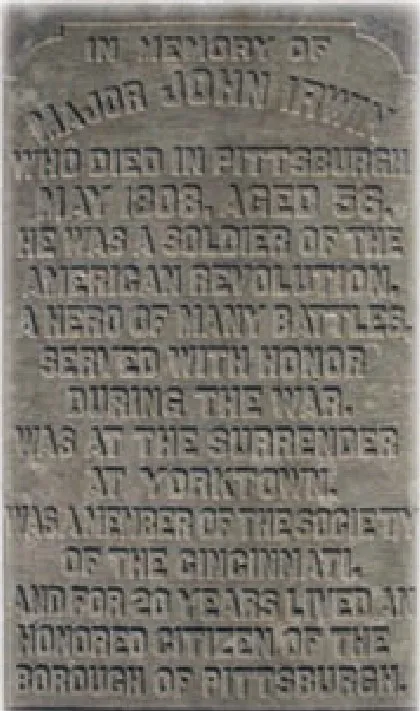Of the thirty-three individuals named John Irwin buried in Allegheny Cemetery, only one had the extraordinary distinction of knowing George Washington, Benedict Arnold, and "Mad" Anthony Wayne.
Born in Ireland, John Irwin immigrated to the United States in the 1770s and settled in Pittsburgh by 1776. Shortly thereafter, he joined the First Pennsylvania Regiment with the rank of lieutenant under the command of Benedict Arnold—who would later become infamous for his betrayal to the British.
In September 1777, General George Washington ordered Brigadier General "Mad" Anthony Wayne to lead a regiment tasked with disrupting British forces. Lieutenant Irwin, now serving as an adjutant officer in the Second Pennsylvania Regiment, joined Wayne's command. On the night of September 21, British troops launched a surprise bayonet-only assault on Wayne's camp, targeting wounded and surrendering American soldiers. This brutal engagement became known as the Paoli Massacre—a dark chapter in British military history.
Irwin was discovered among the fallen, grievously wounded and left for dead. A British soldier delivered a final thrust to his chest before departing the battlefield. Miraculously, Irwin survived. Rescued and moved to Washington's headquarters, he recovered from his injuries and insisted on returning to active duty. His resilience enabled him to rise steadily through the ranks—eventually reaching the rank of colonel.At just twenty-seven years old, Irwin was present at the pivotal Battle of Yorktown. Legend suggests he may have been the first to enter the town after Lord Cornwallis surrendered to American and French forces. Following the war, Irwin became a member of the Society of the Cincinnati, founded in 1783 by officers of the Continental Army to preserve the bonds formed during the Revolution. George Washington was elected the first president.
Back in Pittsburgh, Irwin established the first rope manufacturing company west of the Allegheny Mountains in 1794, located on Smithfield Street—later the site of the renowned Monongahela House hotel. In later years, his wartime injuries forced him to relinquish management of the company to his wife, Mary Pattison Irwin. She proved to be a capable leader, eventually partnering with their twelve-year-old son, John Jr., who went on to become one of the wealthiest figures in Allegheny City.
The company relocated to Third, Fourth, and Liberty Streets (now Liberty Avenue) in 1795, and later to Redoubt Alley. Its final relocation to Allegheny City occurred in 1812—after Irwin's passing.Known for his hospitality and generosity, Irwin frequently recounted the story of surviving the fatal bayonet strike. He would produce his adjutant's order book—kept in his breast pocket the night of the attack—and point to the bayonet hole that had nearly claimed his life.
Colonel John Irwin died on May 5, 1808, leaving behind his wife Mary and four children: Margaret George, Eliza Semple, Dr. W. F. Irwin, and John Jr. He rests in Allegheny Cemetery, Section 11, Lot 40.
